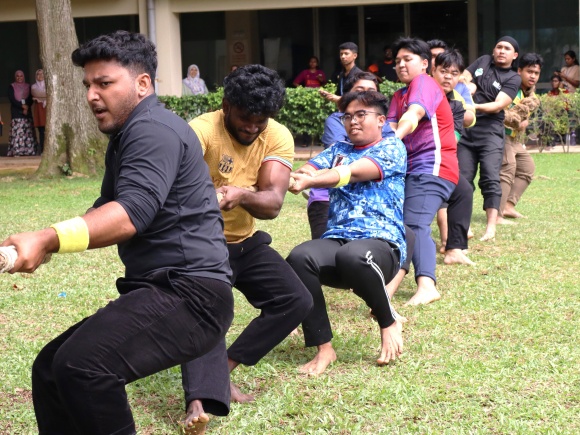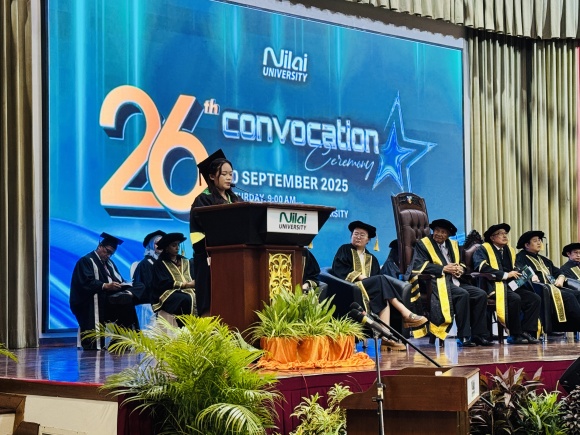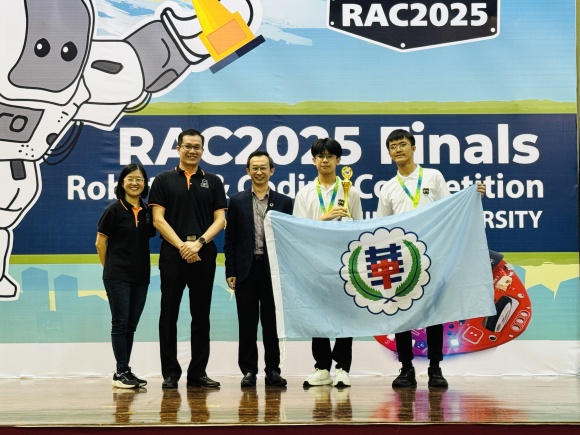An established programme
Since its inception in 2008, the Diploma of Aircraft Maintenance Engineering (DAME) offered at Nilai University incorporates the European Aviation Safety Agency (EASA) syllabi, preparing students for EASA Part 66 category B1.1 and B2 license examinations. Students will sit for EASA license examination simultaneously while pursuing the diploma. It is the first step in gaining a full EASA license.
EASA is the core agency of a new, cost-efficient regulatory system in Europe, which stringently ensures all its partner agencies worldwide are similarly well-organised. EASA is responsible for the airworthiness standards for most civil aircraft registered in European Union member states. (www. easa. eu)
It is important to know that the Diploma in Aircraft Maintenance Engineering (DAME) at Nilai University is open to both Science Stream and non–Science Stream students. However, students will need to get the following scores in their SPM results:
- Three Credits in Mathematics, and Physics or Science
- Passed Bahasa Malaysia and English
- Passed Sejarah
Also, students should be medically fit and have excellent eyesight and hearing with no colour blindness and hearing impairment.
Jason Tan Jen Keat is an alumnus who graduated with a Diploma in Aircraft Maintenance Engineering in 2016 worked in an MRO company specialising in repairs and overhaul of helicopters. He was assigned to inspect and rectify technical issues of aircraft based on the respective maintenance manual.
“In addition, the technical courses taught at Nilai University were relevant. I applied the technical know-how and practical skills such as composite repairs, metal works, structural repairs, turbine engine inspection, and maintenance procedures in my previous role. It’s crucial to take on responsibilities seriously and with integrity. I am committed to these core values even till today when I manage my business,” declared Jason.
Being business savvy, Jason opted to be an entrepreneur after working for a few years. The technical know-how gained during his studies and experience gathered gave him an avenue to start an ingenious business model; supplying qualified professionals for electrical installation in factories.
Jason had enjoyed his varsity years at Nilai University. Then, he would coach squash in Nilai. The balanced learning environment at Nilai University boasted healthy recreational activities. As a gifted State player for squash, he started a squash club at the University.
The multi-faceted learning environment at Nilai University encouraged him to mix with other course mates from different countries. He developed soft skills, which gave him the confidence to communicate with his French and Chinese colleagues from China during his previous employment.
For Charles Tee, the moment he clambered into the cockpit at 19 years old; he knew his calling to excel in the aviation industry. He recalled that during an interview at GE Aviation; the interviewer asked him if he could explain how to tie a three-bolt wire and a gas turbine engine system. Luckily, he could recall what he had learned during his Diploma in Aircraft Maintenance Engineering, and this sealed a position for him at GE Aviation.

A glimpse on the programme structure
The overall course structure comprises both theory and hands-on training for students. In the first year, students will study eight subjects such as basic aerodynamics, electrical fundamentals, digital techniques, etc. While in the second year, students will have to complete another nine subjects such as human factors, aviation legislation, gas turbine engine and more.
“Human factors are closely monitored and managed in the airlines. Body temperature is at the lowest in the wee hours of 4:00 am to 6:00 am. Concentration is also at its lowest. As such, lighter tasks will be assigned,” Selvarajah A/L Chelliah, Senior Instructor quoted the Circadian Theory.
Propelling a conducive learning environment, facilities at Nilai University are among the best in the country. The purpose-built hangar has two aircraft and students have access to proper tooling and equipment during their practical training.
Charles, graduated in 2010 said he was thankful that his father for transferring him to Nilai University. His father firmly believed that an aircraft maintenance engineering course must incorporate EASA Part 66 syllabus. Looking back, Charles felt that students also consider both the educational institute’s reputation, programme structure and syllabi.
What’s next?
The Diploma in Aircraft Maintenance Engineering offers further advancement to higher qualifications. Once students complete their diploma, they have an option to pursue their Advanced Diploma in Aircraft Engineering Technology at Nilai University or to join the workforce.
Students will take only a year to complete the Advanced Diploma, and upon completion, students will also receive an engineering degree from Kingston University, UK.
Once enrolled in the Advanced Diploma in Aircraft Maintenance Engineering, students could apply through the Royal Aeronautics Society (RAES) and register as an Incorporated Engineer (I.Eng).
The Diploma and Advanced Diploma with a top-up UK degree from Kingston University offers students the flexibility to either pursue a career as a Licensed Aircraft Maintenance Engineer or to move on to supervisory and management roles.
An internationally recognised qualification
A UK degree is internationally recognised, and this allows a person to move around easily. Having a degree will help a person perform the job better and ensure upward mobility.
This top-up degree-BEng (Hons) in Aircraft Engineering is more to move people on to supervisory roles within the industry. It is about managing a team and having the ability to deal with uncertain issues. Potential employers may also need people to lead the team, and the degree holder will come across as more confident and knowledgeable. Doing the degree is with long-term career options and rewards in mind.
“Other employment options for graduates may include quality engineer, quality inspector, project engineer, planning engineer and gas turbine mechanics in the oil pump industry too”, said Dr Louie Longasa Timajo, Programme Co-ordinator of the Department of Aircraft Maintenance under the Faculty of Engineering, Science and Technology at Nilai University.
Although the aircraft engineering technology programmes enable various career options, having an EASA license is mandatory for students who desire to be a licensed aircraft maintenance engineer. Only a licenced holder is permitted to certify the airworthiness of an aircraft.
“The Malaysia Aviation Industry is rapidly changing. Malaysian Aerospace Industry Blueprint (2015) forecasted by 2030, the industry will generate an estimated annual revenue of USD14.3 billion. Hence, there are opportunities for relatively good-income positions in Malaysia,” highlighted Dr Louie.
This is another highly rewarding field to be in. An aircraft licensed engineer will be responsible for aircraft worth hundreds of millions of dollars and whether it leaves the ground. Most importantly, it is about the safety of the passengers who will be on the flight.
“Many students think a career with the airline is a bed-of-roses. However, I classify this profession as AWO—All Weather Operations Engineers. If you are working in Europe, then likely you will work under frigid weather,” advised Selvarajah A/L Chelliah, Senior Instructor.
To reach great heights, relevant and sound technical know-how gathered through the different levels of tertiary education; diploma, advance diploma and an honours degree are required.
Study with an ease of mind: Scholarships Available
Nilai University offers up to 100% scholarship to students. Find out about the seven types of scholarships available: Academic-based, Athlete/leadership-based and Needs-Based Scholarship. The education counsellors and experienced lecturers will guide, access and assist you in applying for a scholarship. Nilai University is open daily except on public holidays. Please call 06-850 2308 for an appointment or click on www.nilai.edu.my or visit our campus in Nilai.
Read Online: PressReader.com



